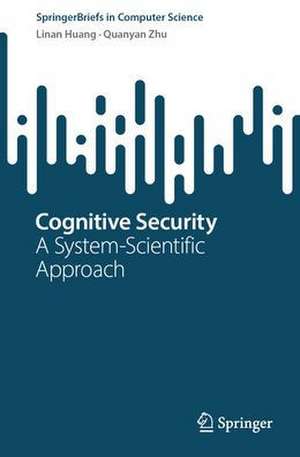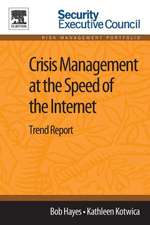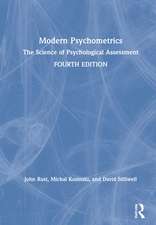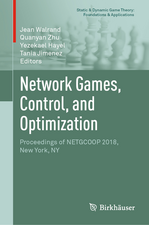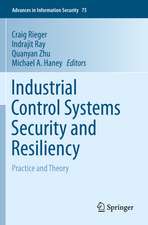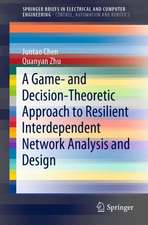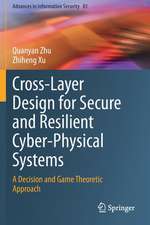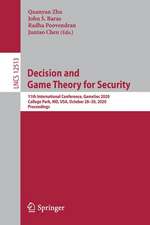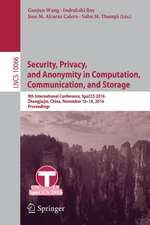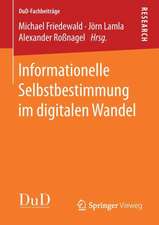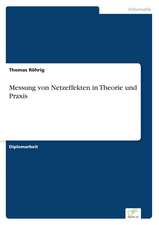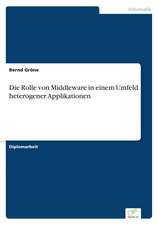Cognitive Security: A System-Scientific Approach: SpringerBriefs in Computer Science
Autor Linan Huang, Quanyan Zhuen Limba Engleză Paperback – 3 iun 2023
This book offers solutions that work across different fields, such as psychology, neuroscience, data science, social science, and game theory, to deal with cognitive threats. It guides the reader through the core ideas with figures, real-life examples, and case studies. Moreover, it formally defines all research questions, presents the results using mathematical theorems and proofs, and obtains insights through numerical validation. This book provides a self-contained and brief overview of essential system-scientific tools for modeling, analyzing, and mitigating cognitive vulnerabilities. The concepts of human cognitive capacities and cognitive vulnerabilities are formally discussed, followed by two case studies in the scenarios of reactive and proactive attention vulnerabilities. This book provides insights and applications on this transdisciplinary topic, with the goal of motivating future research in this emerging area and pushing the frontier of human-technology convergence. This book is a valuable reference for researchers and advanced-level students studying or working in cognitive security and related fields. It is also useful for decision-makers, managers, and professionals working within these related fields.
Din seria SpringerBriefs in Computer Science
-
 Preț: 475.83 lei
Preț: 475.83 lei - 20%
 Preț: 296.17 lei
Preț: 296.17 lei -
 Preț: 446.47 lei
Preț: 446.47 lei -
 Preț: 381.81 lei
Preț: 381.81 lei - 20%
 Preț: 166.97 lei
Preț: 166.97 lei - 20%
 Preț: 325.63 lei
Preț: 325.63 lei - 20%
 Preț: 302.48 lei
Preț: 302.48 lei - 20%
 Preț: 335.65 lei
Preț: 335.65 lei - 20%
 Preț: 406.90 lei
Preț: 406.90 lei - 20%
 Preț: 323.00 lei
Preț: 323.00 lei - 20%
 Preț: 323.00 lei
Preț: 323.00 lei - 20%
 Preț: 322.81 lei
Preț: 322.81 lei - 20%
 Preț: 322.35 lei
Preț: 322.35 lei - 20%
 Preț: 321.85 lei
Preț: 321.85 lei -
 Preț: 375.45 lei
Preț: 375.45 lei - 20%
 Preț: 232.68 lei
Preț: 232.68 lei - 20%
 Preț: 324.17 lei
Preț: 324.17 lei - 20%
 Preț: 323.00 lei
Preț: 323.00 lei - 20%
 Preț: 322.17 lei
Preț: 322.17 lei - 20%
 Preț: 322.50 lei
Preț: 322.50 lei - 20%
 Preț: 323.34 lei
Preț: 323.34 lei - 20%
 Preț: 324.17 lei
Preț: 324.17 lei - 20%
 Preț: 323.46 lei
Preț: 323.46 lei - 20%
 Preț: 322.17 lei
Preț: 322.17 lei - 20%
 Preț: 322.02 lei
Preț: 322.02 lei - 20%
 Preț: 323.46 lei
Preț: 323.46 lei -
 Preț: 374.08 lei
Preț: 374.08 lei -
 Preț: 341.50 lei
Preț: 341.50 lei - 20%
 Preț: 324.49 lei
Preț: 324.49 lei -
 Preț: 344.47 lei
Preț: 344.47 lei -
 Preț: 376.80 lei
Preț: 376.80 lei -
 Preț: 377.18 lei
Preț: 377.18 lei - 20%
 Preț: 324.17 lei
Preț: 324.17 lei - 20%
 Preț: 352.26 lei
Preț: 352.26 lei - 20%
 Preț: 321.32 lei
Preț: 321.32 lei - 20%
 Preț: 322.17 lei
Preț: 322.17 lei - 20%
 Preț: 324.17 lei
Preț: 324.17 lei - 20%
 Preț: 322.02 lei
Preț: 322.02 lei -
 Preț: 374.46 lei
Preț: 374.46 lei - 20%
 Preț: 320.21 lei
Preț: 320.21 lei - 20%
 Preț: 323.34 lei
Preț: 323.34 lei - 20%
 Preț: 324.17 lei
Preț: 324.17 lei - 20%
 Preț: 231.84 lei
Preț: 231.84 lei - 20%
 Preț: 294.95 lei
Preț: 294.95 lei - 20%
 Preț: 322.50 lei
Preț: 322.50 lei -
 Preț: 408.23 lei
Preț: 408.23 lei - 20%
 Preț: 321.52 lei
Preț: 321.52 lei - 20%
 Preț: 323.34 lei
Preț: 323.34 lei - 20%
 Preț: 323.00 lei
Preț: 323.00 lei - 20%
 Preț: 323.80 lei
Preț: 323.80 lei
Preț: 323.99 lei
Preț vechi: 404.99 lei
-20% Nou
Puncte Express: 486
Preț estimativ în valută:
61.100€ • 64.06$ • 51.57£
61.100€ • 64.06$ • 51.57£
Carte tipărită la comandă
Livrare economică 19 martie-02 aprilie
Preluare comenzi: 021 569.72.76
Specificații
ISBN-13: 9783031307089
ISBN-10: 3031307089
Ilustrații: IX, 110 p. 30 illus., 29 illus. in color.
Dimensiuni: 155 x 235 mm
Greutate: 0.19 kg
Ediția:1st ed. 2023
Editura: Springer International Publishing
Colecția Springer
Seria SpringerBriefs in Computer Science
Locul publicării:Cham, Switzerland
ISBN-10: 3031307089
Ilustrații: IX, 110 p. 30 illus., 29 illus. in color.
Dimensiuni: 155 x 235 mm
Greutate: 0.19 kg
Ediția:1st ed. 2023
Editura: Springer International Publishing
Colecția Springer
Seria SpringerBriefs in Computer Science
Locul publicării:Cham, Switzerland
Cuprins
Chapter. 1. Introduction.- Chapter. 2. System-Scientific Methods.- Chapter. 3. Cognitive Capacities for Designing, Operating, Supervising, and Securing Complex Systems.- Chapter. 4. Review of System-Scientific Perspectives for Analysis, Exploitation, and Mitigation of Cognitive Vulnerabilities.- Chapter. 5. ADVERT: Defending against Reactive Attention Attacks.- Chapter. 6. RADAMS: Defending against Proactive Attention Attacks.- Chapter. 7. Summary and Conclusions.
Notă biografică
Linan Huang received the B.Eng. degree (Hons.) in Electrical Engineering from Beijing Institute of Technology, China, in 2016 and the Ph.D. degree in electrical engineering from New York University (NYU), Brooklyn, NY, USA, in 2022. He is currently an assistant researcher at Tsinghua University. He is a recipient of many awards, including the 2022 Dante Youla Award for graduate research excellence, the best paper award at the 2022 GameSec conference, and the 2022 INFORMS MAS Koopman Prize. His research interests include dynamic decision-making in the multi-agent system, mechanism design, artificial intelligence, security, and resilience for cyber-physical systems.
Quanyan Zhu received B. Eng. in Honors Electrical Engineering from McGill University in 2006, M. A. Sc. from the University of Toronto in 2008, and Ph.D. from the University of Illinois at Urbana-Champaign (UIUC) in 2013. After stints at Princeton University, he is currently an associate professor atthe Department of Electrical and Computer Engineering, New York University (NYU). He is an affiliated faculty member of the Center for Urban Science and Progress (CUSP) and Center for Cyber Security (CCS) at NYU. He is a recipient of many awards, including NSF CAREER Award, NYU Goddard Junior Faculty Fellowship, NSERC Postdoctoral Fellowship (PDF), NSERC Canada Graduate Scholarship (CGS), and Mavis Future Faculty Fellowships. He spearheaded and chaired INFOCOM Workshop on Communications and Control on Smart Energy Systems (CCSES), Midwest Workshop on Control and Game Theory (WCGT), and ICRA workshop on Security and Privacy of Robotics. His current research interests include game theory, machine learning, cyber deception, network optimization and control, smart cities, Internet of Things, and cyber-physical systems. He has served as the general chair or the TPC chair of the 7th and the 11thConference on Decision and Game Theory for Security (GameSec) in 2016 and 2020, the 9th International Conference on NETwork Games, COntrol and OPtimisation (NETGCOOP) in 2018, the 5th International Conference on Artificial Intelligence and Security (ICAIS 2019) in 2019, and 2020 IEEE Workshop on Information Forensics and Security (WIFS). He is a co-author of four recent books published by Springer: Cyber-Security in Critical Infrastructures: A Game-Theoretic Approach (with S. Rass, S. Schauer, and S. König), A Game- and Decision-Theoretic Approach to Resilient Interdependent Network Analysis and Design (with J. Chen), Cross-Layer Design for Secure and Resilient Cyber-Physical Systems: A Decision and Game Theoretic Approach(with Z. Xu), Game Theory for Cyber Deception (with J. Pawlick).
Textul de pe ultima copertă
Caracteristici
This book presents the latest research in cognitive security This book offers solutions that work across different fields This book provides a self-contained and brief overview of essential system-scientific tools
